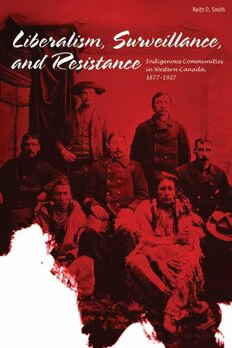
Liberalism, Surveillance, and Resistance: Indigenous Communities in Western Canada, 1887-1927 PDF
334 Pages·2009·2.67 MB·English
Most books are stored in the elastic cloud where traffic is expensive. For this reason, we have a limit on daily download.
Preview Liberalism, Surveillance, and Resistance: Indigenous Communities in Western Canada, 1887-1927
Description:
This book explores the application of liberalism in the period between 1877 and 1927 in southern Alberta and the British Columbia interior. In these regions at least, liberalism proved to be an exclusionary force that allowed for extraordinary measures to be employed to remove Indigenous peoples from the territories of their ancestors. The expansion of liberalism, diverse and multifaceted in construction, but undeniably debilitating in its impact on First Nations people, was facilitated, fashioned, and justified by means of disciplinary surveillance. In addition, the surveillance network (which included government officials, police officers, church representatives, ordinary settlers, and others) clearly functioned to inculcate Anglo-Canadian liberal capitalist values, structures, and interests as normal, natural, and beyond reproach. At the same time, the network operated to exclude or restructure the economic, political, social, and spiritual tenets of Indigenous cultures.While none of this proceeded unchallenged, surveillance served as well to mitigate against, even if it could never completely neutralize, resistance. Smith provides important historical context to the current circumstances in Western Canada in which Indigenous peoples must struggle in the courts, at treaty negotiating tables, and by extralegal means to obtain justice and security for their families and communities.
See more
The list of books you might like
Most books are stored in the elastic cloud where traffic is expensive. For this reason, we have a limit on daily download.
